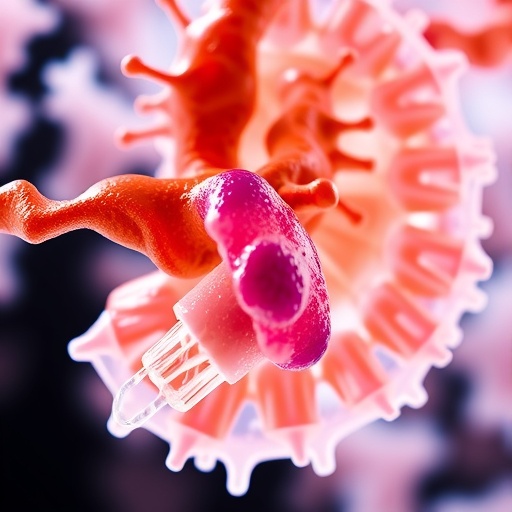In the quest to unlock the mysteries of pancreatic cancer, researchers have increasingly turned their attention to the role of glycosylation in disease diagnosis and progression. A recent study published in Clinical Proteomics sheds light on the intricate relationship between specific N-glycosylation patterns and the presence of pancreatic cancer, marking a significant advancement in diagnostic methodologies. This groundbreaking research, led by experts Jin, Hu, and Gu, details the quantitative analysis of site-specific N-glycosylation on immunoglobulin G (IgG) molecules, revealing critical insights into potential biomarkers for this lethal form of cancer.
Pancreatic cancer remains one of the most deadly malignancies, with a sobering five-year survival rate that often hovers around 10%. The late-stage diagnosis of pancreatic cancer has historically posed significant challenges to effective treatment and patient outcomes. As scientists continue to explore the biological underpinnings of this complex disease, the identification of novel diagnostics has become a crucial goal. The recent findings offer hope that personalized medicine can be enriched through a deeper understanding of glycosylation changes that accompany tumorigenesis.
The study’s innovative approach centers on the precise analysis of N-glycosylation, a critical post-translational modification that affects protein function and stability. N-glycans attached to the IgG molecules serve as both functional and structural components, influencing the immune response. Changes in the glycosylation patterns of IgG in patients with pancreatic cancer have been shown to correlate with disease presence, making it a promising avenue for diagnostic exploration. By utilizing advanced techniques, the research team was able to elucidate the specific glyco-signatures characteristic of pancreatic cancer.
Within the framework of the study, the researchers undertook a quantitative profiling of IgG glycoforms, employing a range of cutting-edge mass spectrometry techniques. This method allowed them to dissect and identify the particular glycosylation sites on the IgG molecule. With extraordinary precision, the researchers were able to spotlight alterations in glycan expressions associated with cancerous conditions compared to healthy controls. Such granular data enables a more refined understanding of how these modifications can serve as potential biomarkers for disease detection.
In their analysis, the team discovered distinct variations in N-glycan structures between pancreatic cancer patients and the control group. The observations highlighted a decrease in galactosylation and an increase in fucosylation patterns within the tumor-affected patients. These findings mirror previous research suggesting that certain glycosylation changes could influence immune evasion by tumors, further illustrating the nuanced interplay between cancer and glycan composition. The implications of this research extend beyond mere diagnostics, suggesting that glycosylation profiles could soon become integral components of individualized treatment protocols.
Another remarkable aspect of the findings hinges on the potential for early detection. The ability to discern specific IgG glyco-signatures could pave the way for the development of screening tools to catch pancreatic cancer in its nascent stages, dramatically improving patient survival odds. As the research highlights, earlier interventions could mean the difference between a treatable condition and a terminal diagnosis, underscoring the urgency for continued exploration of glycosylation patterns in other cancer types as well.
The researchers ambitiously advocate for these glyco-signatures to be incorporated into clinical settings. If validated through further studies, such diagnostic tools could lead to revolutionary changes in how pancreatic cancer is detected and managed within healthcare systems worldwide. Clinical implementation would require collaboration across various scientific domains, including oncology, immunology, and glycomics, to fully realize the potential of these strategies.
The research team plans to continue their studies, aiming to explore the mechanistic roles that specific glycosylation changes play in pancreatic cancer pathogenesis. Understanding the biological importance of these alterations will be pivotal in elucidating their functional consequences and how they may contribute to disease progression. By revealing these connections, they hope to offer insights into therapeutic windows and intervention strategies that target the underlying biology of pancreatic cancer.
Furthermore, while the focus has been predominantly on IgG glycosylation, the research team’s methodology could also be applied to other proteins and glycoproteins relevant in cancer biology. This multidimensional approach could open up new avenues for research and ultimately facilitate the discovery of additional biomarkers across various cancers. The integration of technology, biology, and clinical implications paints a promising picture for the future of cancer diagnostics and treatment paradigms.
Overall, this innovative study represents a significant contribution to the field of cancer research, particularly in the context of pancreatic cancer. By elucidating the connections between N-glycosylation patterns and disease states, the authors pave the way for a new era of precision medicine that harnesses the power of glycan profiling. As research continues to evolve, the hope is that these advancements will not only improve diagnostic accuracy but also usher in transformative therapies aimed at conquering one of the most challenging cancers we face today.
In conclusion, the work detailed by Jin, Hu, and Gu presents a leap forward in pancreatic cancer diagnostics through the robust analysis of IgG glyco-signatures. As this research garners attention, it sets the stage for collaborative efforts that span multiple disciplines, signaling a paradigm shift in our approach to understanding and fighting cancer. Through the lens of glycosylation research, we can envision a future where early detection and personalized treatment strategies become the norm, significantly altering the prognosis for patients battling this formidable disease.
Subject of Research: Glycosylation in pancreatic cancer diagnosis
Article Title: Quantitative site-specific N-glycosylation analysis reveals IgG glyco-signatures for pancreatic cancer diagnosis.
Article References:
Jin, Y., Hu, R., Gu, Y. et al. Quantitative site-specific N-glycosylation analysis reveals IgG glyco-signatures for pancreatic cancer diagnosis.
Clin Proteom 21, 68 (2024). https://doi.org/10.1186/s12014-024-09522-4
Image Credits: AI Generated
DOI:
Keywords: Pancreatic cancer, N-glycosylation, IgG glyco-signatures, biomarkers, diagnostic tools.




